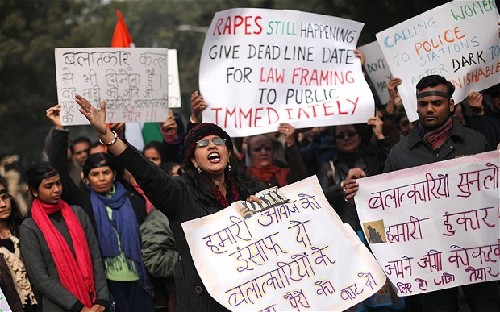|
查看原文
A man who allegedly drugged and raped his wife has been acquitted after a judge confirmed Indian rape laws do not apply to married couples.
Feminist campaigners said the judgment highlighted the failure of Indianlaw to protect the majority of women in the country – those who are married – from being raped or their right to refuse to have sex with their husbands.
In this latest case, the women, whose identity was not revealed, claimed her marriage was illegal and had been conducted against her will after she had been sedated.
A man, identified only as Vikash, had taken her to a registry office in Ghaziabad, just outside New Delhi, in March last year where he forced her to sign a marriage certificate while she was intoxicated. He later raped her and then fled, she alleged.
The accused denied drugging the woman or raping her and said their marriage had been consensual. She had only alleged rape six months after their marriage when they became involved in a property dispute.
In his judgment, Judge Virender Bhat said there was no evidence Vikash had drugged his wife or forced her to marry him but even if he had forced the complainant to have sex with him, it would not be a crime under Indian law.
"The prosecutrix (the wife) and the accused (Vikash) being legally wedded husband and wife, and the prosecutrix being major, the sexual intercourse between the two, even if forcible, is not rape and no culpability can be fastened upon the accused", the court ruled.
The ruling was made just over a year after the Indian government strengthened its rape laws and increased sentences amid a public outcry over the gang-rape and murder of a student on a Delhi bus.
The changes were based on the recommendations of the Verma Committee, headed by the late Justice Verma, who also urged the government to criminalise rape within marriage.
"Under the Indian Penal Code sexual intercourse without consent is prohibited. However, an exception to the offence of rape exists in relation to un-consented sexual intercourse by a husband upon a wife. The Committee recommended that the exception to marital rape should be removed. Marriage should not be considered as an irrevocable consent to sexual acts,” the Committee said in its report.
His recommendation however was rejected amid fears that it would encourage false cases and damage the institution of arranged marriages which are usually based on financial deals between families.
"Rape within marriage is not illegal in India which says everything about the position of women. We are donated for marriage rather than enter it as a partner. The ownership is with the man and whatever he does after marriage is acceptable", said Ranjana Kumari, a women’s rights campaigner who lobbied members of parliament on the issue.
Nilanjana Roy, a leading author and campaigner, said the law as it stands in India offers no protection to women raped by their husbands but can intervene in cases of domestic violence.
"Under Indian law, what the judge has said is correct and that is horrifying. It’s easier for a woman to file a case for a black eye. If a woman is being repeatedly raped in a marriage and he does not use extreme violence, she has no recourse in law, there is nothing she can do", she said.
|
查看譯文
據(jù)外媒報(bào)道���,在法官確認(rèn)印度強(qiáng)奸法律不適用于已婚夫婦之后,一名涉嫌對(duì)其妻子服用麻醉劑后實(shí)施強(qiáng)奸的男子被判無(wú)罪���。
女權(quán)活動(dòng)家們說(shuō)����,該判決凸顯印度法律的缺陷����,這些法律在印度本應(yīng)保護(hù)廣大婦女(已婚婦女)不被強(qiáng)奸或其有權(quán)拒絕和丈夫做愛(ài)。
最新案件中���,女受害者聲稱她的婚姻是非法的��,是被灌醉之后做了違背意愿的事��。
去年3月�����,名叫Vikash的男人把她帶到新德里郊外的阿巴德一所登記處��,在她不清醒的狀態(tài)下強(qiáng)迫她在結(jié)婚證書(shū)上簽字�����,后來(lái)又強(qiáng)奸了她�,然后逃之夭夭���。
被告否認(rèn)給原告服用麻醉劑或?qū)嵤?qiáng)奸����,并稱他們的婚姻是自愿的�����。婚后六個(gè)月當(dāng)他們發(fā)生財(cái)產(chǎn)糾紛時(shí)��,她才指控丈夫強(qiáng)奸她����。
在判決中,法官Virender Bhat表示:沒(méi)有證據(jù)表明Vikash給他的妻子下藥或強(qiáng)迫她嫁給他�����,但即使他強(qiáng)迫原告與其發(fā)生性關(guān)系�,根據(jù)印度法律,也不是犯罪����。
法院裁定:“女原告(妻子)和被告(Vikash)在法律上是合法夫妻,而且女原告(妻子)是成人�����,兩者之間的性交�,即使是強(qiáng)迫,也不認(rèn)定為強(qiáng)奸�����,不能將罪行強(qiáng)加給原告�����?��!?/p>
一年前���,因新德里公交車上團(tuán)伙強(qiáng)奸和謀殺一名學(xué)生引起公眾強(qiáng)烈抗議,印度政府修訂其強(qiáng)奸法并加重判刑�����。但法院依然做出了上述的裁決����。
由大法官維爾馬為首的委員會(huì)建議修訂法律,并敦促政府對(duì)婚內(nèi)強(qiáng)奸定罪�����。
委員會(huì)在其報(bào)告中表示:“根據(jù)印度刑法����,未經(jīng)同意禁止發(fā)生性行為��。然而強(qiáng)奸罪的一個(gè)例外就是未經(jīng)同意丈夫?qū)ζ拮訉?shí)施性行為����。委員會(huì)建議婚內(nèi)強(qiáng)奸的例外應(yīng)該被廢除����。婚姻不應(yīng)該被視作準(zhǔn)許無(wú)條件地實(shí)施性行為��?�!?/p>
然而�,由于擔(dān)心這會(huì)助長(zhǎng)虛假案件,并且還會(huì)損害常?���;趦杉彝ブg金錢交易的包辦婚姻制度,所以他的建議遭到拒絕��。
就此問(wèn)題游說(shuō)國(guó)會(huì)議員的婦女權(quán)利活動(dòng)家蘭加納?古默里說(shuō):“婚內(nèi)強(qiáng)奸在印度并非違法����,這一切反映了婦女的地位��。與其說(shuō)作為伴侶結(jié)婚��,倒不如說(shuō)把我們捐贈(zèng)給了婚姻�。男人占據(jù)主導(dǎo)權(quán)����,而且婚后不管他做什么都是可以接受的����。”
大作家及活動(dòng)家蘭加納?古默里說(shuō)��,在印度就目前現(xiàn)狀來(lái)說(shuō)��,法律對(duì)被丈夫強(qiáng)奸婦女沒(méi)有提供保護(hù)�����,但可以干預(yù)家庭暴力案件�����。
蘭加納?古默里說(shuō):“根據(jù)印度法律�����,法官所說(shuō)的是正確的,但也是可怕的�����。對(duì)女人來(lái)說(shuō)挨打更容易立案��。如果一個(gè)女人在婚姻中多次被強(qiáng)奸����,而其丈夫沒(méi)有用極端暴力的話,在法律上她沒(méi)有追索權(quán)�,所以她也就無(wú)能為力?����!?/p>
(譯者 Catheline 編輯 丹妮)
掃一掃�,關(guān)注微博微信
 
|


